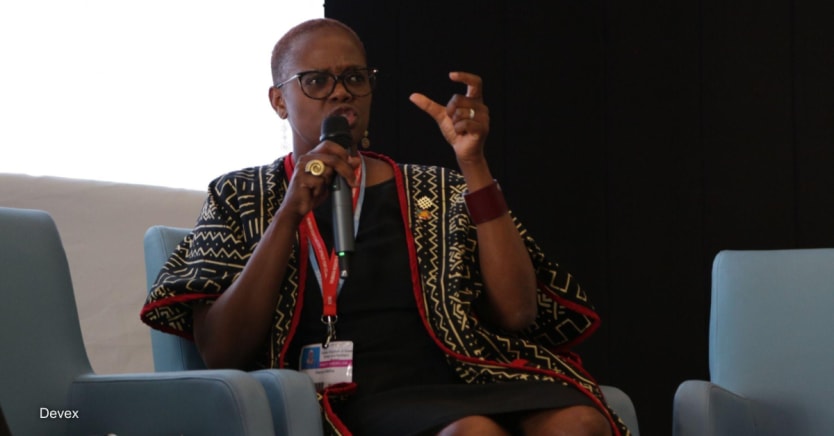
If a woman who grows bananas in Uganda tries to sell her produce across the border in Kenya, she has to send a fax.
It’s just one of the many barriers standing in the way of intra-African trade, as the smallholder farmers who grow the majority of the world’s food often don’t have access to fax machines, according to Wanjira Mathai, managing director for Africa and global partnerships at the World Resources Institute.
Meanwhile, the consequences of climate change are putting their livelihoods at risk.
WRI, which describes itself as “a research-to-action organization,” is helping women farmers and food producers face climate change, which has added a layer of challenges.
“The food we consume everyday is largely produced by women,” Mathai said at a Devex event held on the sidelines of the 27th United Nations Climate Change Conference. “Climate change has completely disrupted food production in ways that disrupt not only their ability to feed their families, but also their ability to engage in the business of food production, getting food to market, producing food.”
“It is extremely shocking that we lose 4.3 million people a year, largely women and children, because of kitchens that are really killing chambers.”
— Wanjira Mathai, managing director for Africa and global partnerships at the World Resources InstituteGiven the many climate-related shocks these women face — such as floods and droughts becoming more frequent and severe — WRI is using its approach to ensure women farmers and food producers across the African continent weather the storm.
For example, the COVID-19 pandemic, and its impact on supply chains, underlined how African countries could not continue to rely on imports of food products from outside the continent. The African Continental Free Trade Agreement, which was brought into force last year, is meant to accelerate trade between countries on the continent — in theory preventing issues like the inability to send a fax barring bananas from getting over the border to be sold.
WRI is highlighting the opportunity this represents for women to trade food and food products, and policies that could make the agreement most impactful for women, Mathai said.
Mathai — who is the daughter of Wangari Maathai, the first African woman to win the Nobel Peace Prize — framed some of the key issues related to women and climate change as matters of justice.
UN Women wants to give African women farmers a voice at COP 27
The United Nations gender equity division is planning to push conversations about climate finance for African women at the global climate summit in Egypt this month.
For example, helping people transition from using wood or charcoal fuels to alternatives that are better for human and planetary health is an energy justice issue, Mathai said. And women are among the most affected.
“Women are the custodians of processing food,” she said. “It is extremely shocking that we lose 4.3 million people a year, largely women and children, because of kitchens that are really killing chambers.”
“The burden of reducing emissions is not on these communities at all,” Mathai added. “There is an absolute imperative that we solve that issue, primarily because of the health impacts.”
Advances in financial technology, like the M-PESA mobile money system in Kenya, where Mathai is based, have yielded huge benefits for women farmers and food producers, she added.
These tools allow small amounts of money to be borrowed and paid, allowing women to transact and engage in the markets. Mathai cited a study where the most transactions by women were at 3 a.m., when women were borrowing what they needed to get their produce to market, with almost 100% of them paying it back by 7 a.m.
Access to credit, and financial inclusion, is critical for women farmers to engage in markets, she said — and it’s another matter of justice.
“If we don't do that, we can’t expect them to essentially work their way out of poverty to start, but also to become productive players in the food market,” she said.
Another issue Mathai is following is how to ensure the financing going to adaptation, or adjusting to the effects of climate change, reaches these women on the front lines of climate change.
“Locally led adaptation is something I'm following very closely — creating mechanisms to make sure that finance actually flows to the women who need it,” she said.




